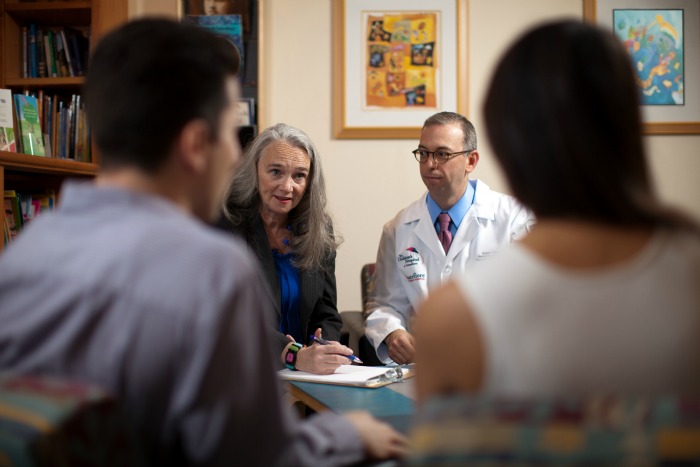
In September, when I embarked on a career shift and had the opportunity to explore issues of bioethics in which I had long been interested, I found that during every cocktail party or casual discussion, people asked me “Why are you doing that?” The question was quickly followed by a second: “Exactly what is bioethics?”
“It sounds ‘way cool,’” said a business school classmate of mine.
“Very leading edge,” said a friend who is a baby boomer classics professor.
“Wow, you could be a pundit,” said a savvy Gen Xer, “. . . whatever pundits in bioethics do.”
These comments came not only from my highly educated baby boomer peer group—a cohort of Americans used to wanting to change things—but also from members of the next generation who are thinking about the politics of healthcare and the accessibility of care for themselves and their children. As the recent presidential election showed, many in our society are worried about just how to navigate the healthcare “nonsystem” and to care for themselves and their families.
By 2013, baby boomers born in the middle years (1946–58) of the robust “American Century” will have turned 55 or older and will face the task of navigating the “geriatrics years.” For most baby boomers, geriatrics does not mean knitting daily. (I actually know 20-somethings in California who knit more than my baby boomer peers.) The members of my cohort of baby boomers are still busily into work, thinking about their kids’ careers, what to do about their hair color and, of course, that hallmark of the generation born between 1946 and 1964, the always important question of self-actualization.
So what’s bioethics got to do with it? Bioethics is a much-needed multidisciplinary study that examines the law (a frequent arbiter of ethical issues in healthcare), philosophy (what is morality anyway? And why should we, as a society, care?) and literature (which has long dealt with issues of life and death: “tomorrow, and tomorrow, and tomorrow, creeps in this petty pace . . .”), as well as the commercial aspects of medical decisions (what should a hospital, a drug company, society pay to ensure the good of the few versus the good of the many?).
Bioethics is to the 21st century what the education of masses of Americans was to the 20th. After World War II, the GI Bill sent millions to college, moved the population from the factories into professional jobs and changed the culture of America. In the 21st century, with a population that is older than ever before, the country is facing new challenges: “How to live long and . . .” (to corrupt a baby boomer TV phrase) “as a society, prosper.”
Living long can be expensive—not just because handicap vans, drugs and hospital beds cost a lot, but because living long forces us to consider what we really believe. Is the life of an 85-year-old as important as the life of a 25-year-old? If society has enough money to treat only one and not the other, who should be treated? What is the relative contribution to society of youth, energy and unfulfilled potential versus experience, elderly resilience and presumed wisdom? What can we learn from each member of our diverse American population? Is society better if we treat the disabled, or if we instead let them seek peaceful assisted deaths?
“Where is wisdom to be found?” asks the Yale scholar Harold Bloom, who believes America is on the same trajectory as ancient Rome. I disagree. America has the evolutionary advantage of several millennia of philosophy, law, religious discourse and literature chronicling tough moral, financial and emotional decisions. Bioethics at Einstein and Cardozo is the repository and gatekeeper for much of that knowledge. Studying bioethics is a way to tap into that collective wisdom for the good of society and for ourselves. As for me, I can’t think of a better way for a baby boomer to spend her intellectual life.


Comments on this entry are closed.
Ms. Rossetti,
I applaud your choice to be a leader in a field that faces questions no one is comfortable with facing.
As a Neonatologist I saw bioethics played out daily in the decisions to treat newborns,
Best of Luck and continued success.
WAB
Dear Dr. Broome,
Thank you for your kind words. Bioethics is a labor of love for me, so I am glad you appreciated the sentiments and challenges I tried to encapsulate In the brief essay.
What wonderful work you and other neonatologists do! I am sure many parents are grateful.
Sincerely,
Angela Rossetti
Ms. Rossetti’s piece on bioethics is “right on,” to quote another baby boomer phrase from way back when. There are many tough questions out there, relating to health care and who should get it and how much of it and when, and I think those questions have never been more timely than right now – with the Affordable Care Act looming over our heads. Whether you agree with it or not, that law will certainly change the face of health care in America as we know it, making all of these issues more relevant than ever before. I don’t know what the right answers are but I’m glad there are people who are pondering the questions.